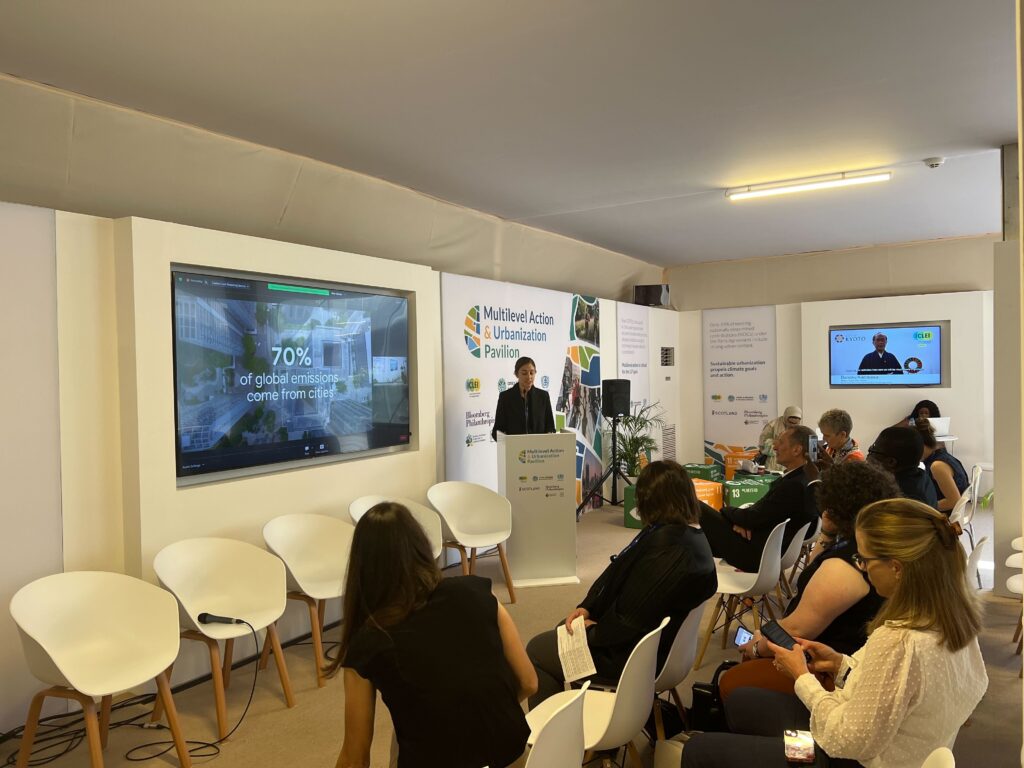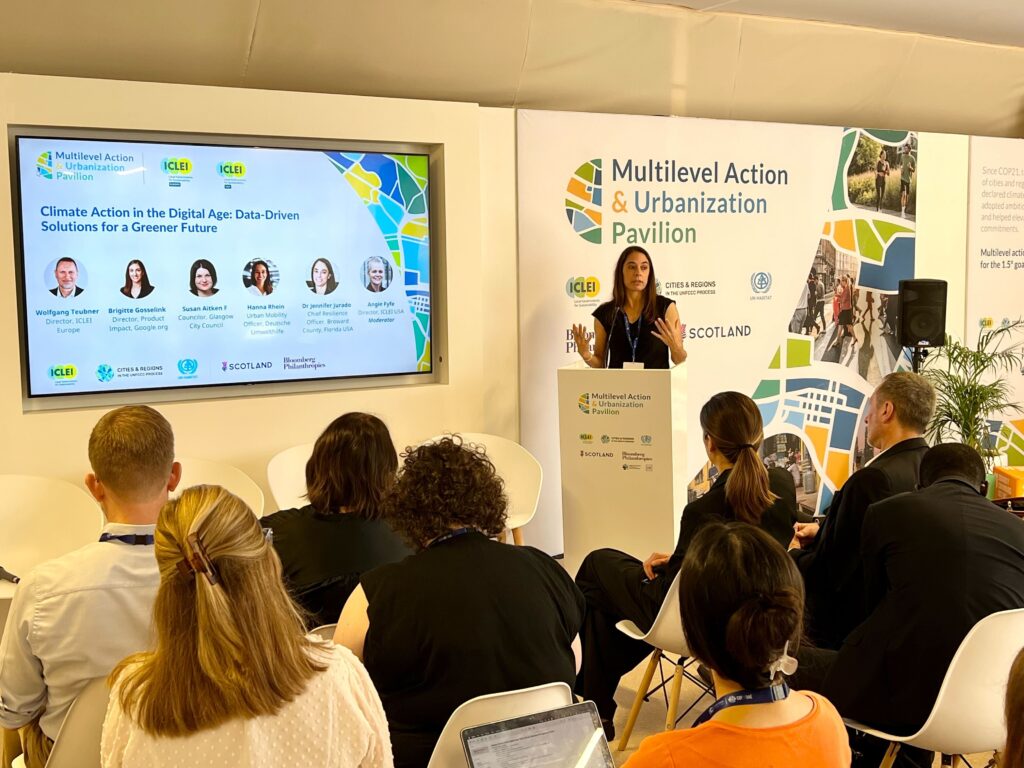Amidst the era of digital advancement, technology serves as a cornerstone for informed decision-making, when aligned to serve long-term sustainability goals. In the crucial endeavor to reach the 1.5°C target, embracing data-driven approaches becomes imperative for supporting decisive climate action.
An ICLEI session brought attention to the intersection of technological innovation and environmental responsibility, highlighting the pivotal role of data-driven approaches and cross-sector partnerships in addressing the climate emergency. For instance, ICLEI’s collaboration with Google stands as a notable partnership aimed at enhancing city data quality and accessibility. This collaboration extends to supporting data-driven approaches through initiatives like the Action Fund and leveraging Google’s Environmental Insights Explorer data with the Clearpath Climate Planner Tool.

Climate Action in the Digital Age
Speaking about climate action in the digital age, Brigitte Gosselink, Director, Google.org — AI and Sustainability, highlighted the impact of cities contributing to 70% of global emissions and facing challenges in infrastructure and resident well-being. Stressing the need for extensive emission reductions, she outlined Google’s commitment to a 24/7 carbon-free energy operation, aiming to reduce 1 gigaton of carbon equivalent emissions annually by 2030 through collaborative efforts. Recognizing data gaps for governments, Google’s EIE, launched six years ago, provides a free platform to over 40,000 cities globally to use mapping and AI to measure emissions, analyze data, and devise strategies.
Emphasizing the pivotal role of data-driven finance, Gooselink said, “Data is truly only as valuable as the actions taken with it.” In line with this perspective, Google supports the Action Fund, a $10 million initiative fostering environmental projects in partnership with nonprofits, universities, and cities. Gooselink underscored the significance of meaningful data utilization, evident in ICLEI USA and EU Action Fund. These efforts concentrate on four essential project elements:
- constructing new datasets
- promoting citizen engagement
- forging authentic city partnerships, and
- embracing an equity-oriented and replicable approach.
Data-Driven Solutions From Across the Globe
Glasgow Environmental Monitoring of Indoor and Outdoor Air (GEMINOA) Project
Councillor Susan Aitken discussed the ICLEI Action Fund’s significant role in expanding air quality initiatives, particularly the GEMINOA project, aiming to enhance the City’s understanding of air quality and health impacts in collaboration with the University of Strathclyde. She emphasized a commitment to open government participation, stressing the importance of data accessibility for communities and driving equity and social justice.
Aitken also shared the ambitious goal of achieving net-zero status by 2030 through various data-driven initiatives, such as constructing Europe’s first-ever smart canal and implementing a low-emissions zone in the city. She reinforced this ambitious climate action by sharing, “It is about reducing emissions, but first and foremost, it is about public health and social justice.”
Additionally, she advocated for the integration of AI, exemplified by Glasgow’s bid for an Urban Data Center at the University of Glasgow, emphasizing the necessity of collaboration with tech corporations like Google and city networks such as ICLEI to proactively navigate technological advancements and stay ahead in forums like COP.
Pop-Up Republic: New Mobility Berlin
Presenting the Pop-Up Republic project, funded by the ICLEI Action Fund, Hanna Rhein, the project manager, shared how the project propelled the transition in mobility for climate protection and clean air. The project focused on three key measures: implementing safe cycling infrastructure, extending public management with reduced parking space, and enforcing a 30 km/h speed limit on main roads. Notably, the project reduced car traffic by 22% on Kantstrasse, saw a remarkable 232% increase in bicycles after introducing a pop-up cycle lane, and estimated a reduction in nitrogen dioxide emissions ranging from 3 to 7.6 μg/m3. Further evaluation of Müllerstrasse showcased a 31% increase in bicycle traffic and a 17% decrease in car traffic. Rhein emphasized the crucial role of good data and its analysis in effecting traffic transformation, demonstrating positive impacts to convince people of the benefits.
Data and modeling in Broward County, Florida
Dr Jennifer Jurado, Chief Resilience Officer & Deputy Department Director at Broward County Government, shared Broward County, Florida, USA’s efforts in leveraging data for climate and mobility projects. The County’s emphasis is on the partnership with ICLEI, highlighting insights into emissions and its role in securing federal grants. The update discussed the use of spatial data for flood and heat risk assessments, showcasing the integration of co-beneficial investments. Dr. Jurado shared the challenges, including data costs and platform updates, underscoring the ongoing importance of data in decision-making for climate-related issues.

Synergizing Partnerships and Data for Effective Climate Action
In summary, the session emphasized the pivotal role of technology and data-driven approaches in advancing climate action during the digital age. Collaborations like ICLEI and Google emphasize the importance of partnerships for addressing immediate climate challenges and ensuring a sustainable future. The commitment to data-driven solutions, exemplified by initiatives like the Action Fund, underscores the transformative impact of meaningful data utilization.
*This blog was written based on the ICLEI ES & USAO COP28 session “Climate action in the digital age: Data-driven solutions for a greener future” at the Multilevel Action & Ubanization Pavillion. You can watch the livestream here.
